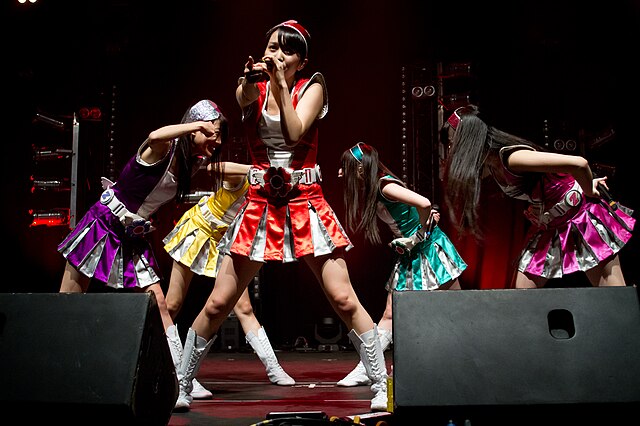An idol is a type of entertainer marketed for image, attractiveness, and personality in Japanese pop culture. Idols are primarily singers with training in other performance skills such as acting, dancing, and modeling. Idols are commercialized through merchandise and endorsements by talent agencies, while maintaining a parasocial relationship with a financially loyal consumer fan base.
AKB48 (pictured 2009) is Japan's best-selling idol group and holds the Guinness World Record for "largest pop group", with more than 90 members divided among several teams.
Morning Musume (pictured 2016), the longest-running female idol group, renewed interest in idols in the 1990s. They hold the record for the most consecutive top 10 singles for any Japanese artist.
Momoiro Clover Z (pictured 2012) ranked number one among female idol groups, according to The Nikkei 2013–2018 surveys.
Babymetal (pictured 2014), whose third studio album, Metal Galaxy, is the highest charting Japanese-language album on the US Billboard 200 chart.
Japanese popular culture includes Japanese cinema, cuisine, television programs, anime, manga, video games, music, and doujinshi, all of which retain older artistic and literary traditions; many of their themes and styles of presentation can be traced to traditional art forms. Contemporary forms of popular culture, much like the traditional forms, are not only forms of entertainment but also factors that distinguish contemporary Japan from the rest of the modern world. There is a large industry of music, films, and the products of a huge comic book industry, among other forms of entertainment. Game centers, bowling alleys, and karaoke parlors are well-known hangout places for teens while older people may play shogi or go in specialized parlors. Since the end of the US occupation of Japan in 1952, Japanese popular culture has been influenced by American media. However, rather than being dominated by American products, Japan localised these influences by appropriating and absorbing foreign influences into local media industries. Today, Japanese popular culture stands as one of the most prominent and influential popular cultures around the world.

Sign used to sell kawaii goods at a shop in Japan
An example of commercial mascots
Gothic Lolita Japanese fashion
Poster for Godzilla (1954), which was the first film to feature the globally famed eponymous monster. The film was amongst Japan's first thoroughly successful films, starting the longest continuously running film series in film history, and making Godzilla's innovator Eiji Tsuburaya one of the most influential people in cinematic history.








